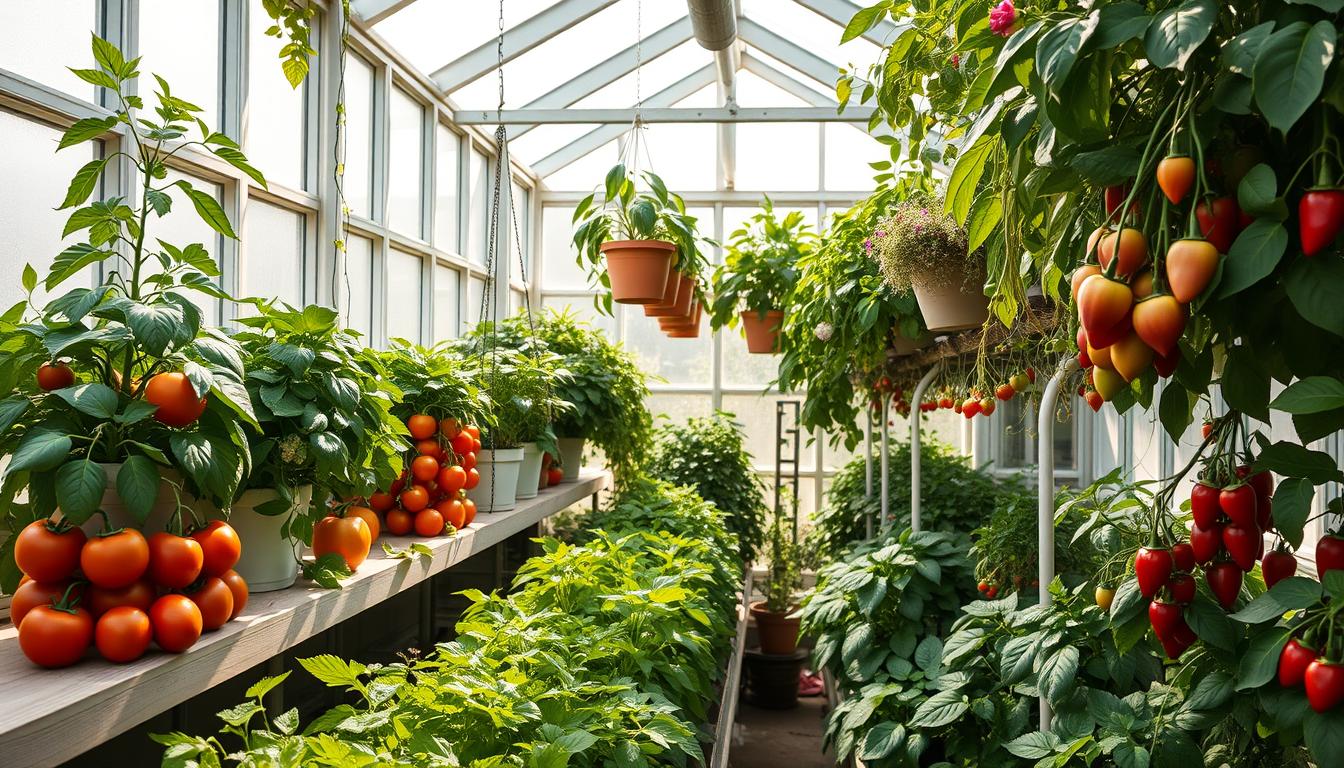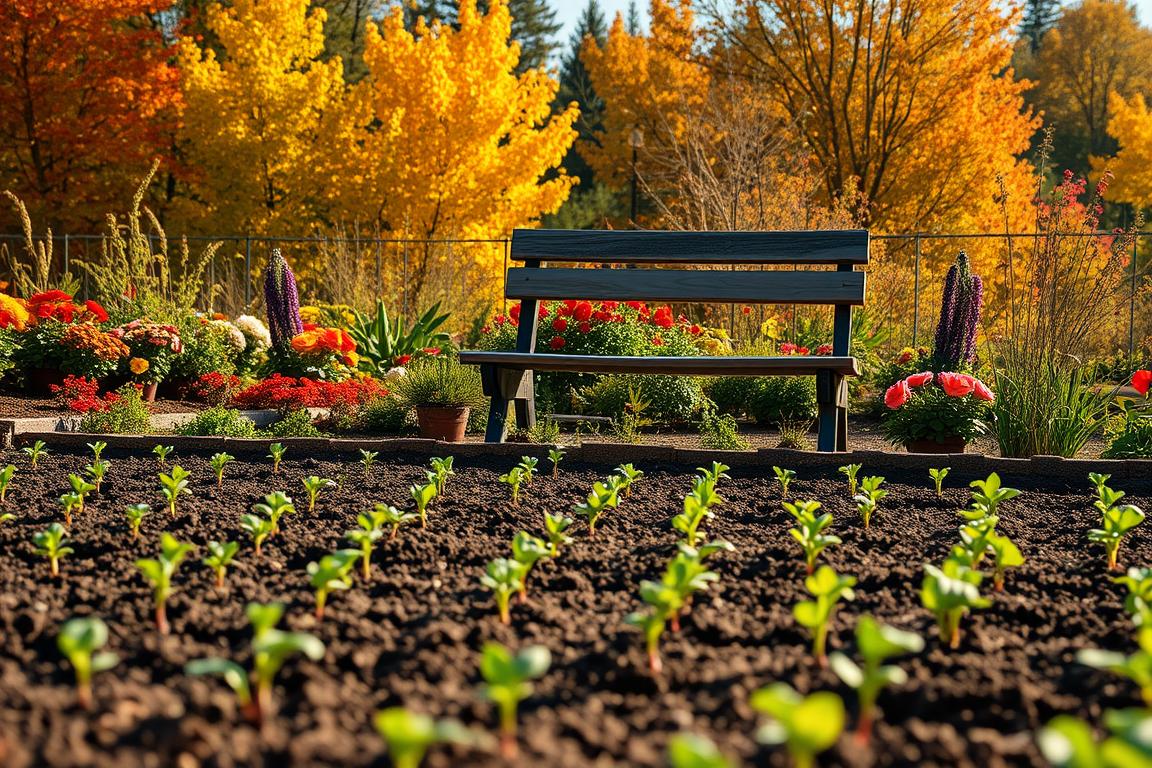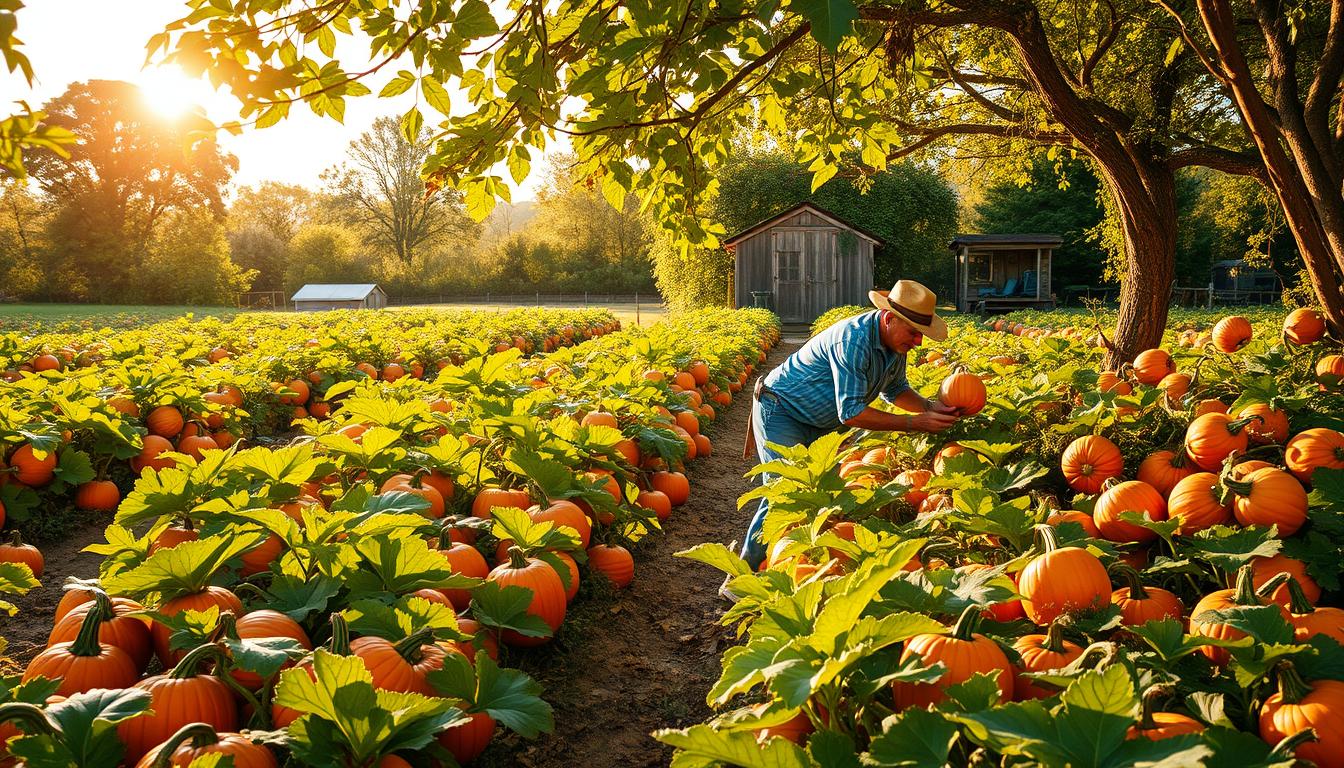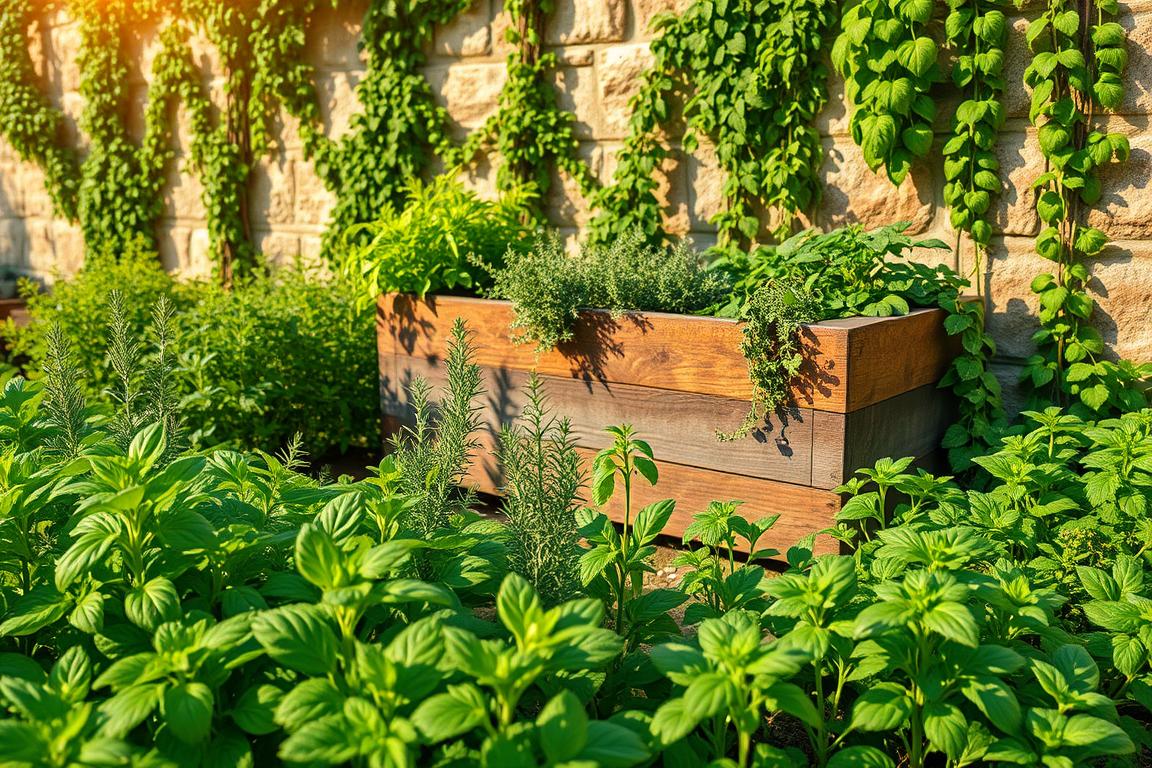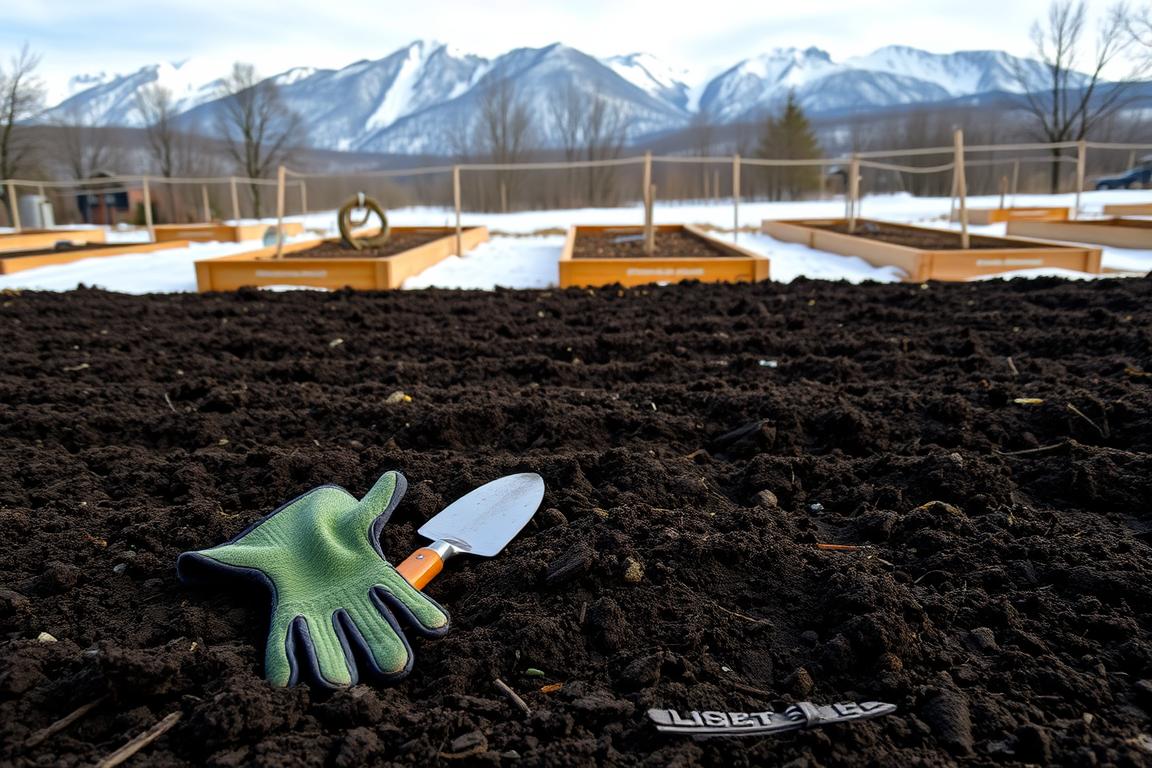Growing a thriving greenhouse is a joy for gardeners. It extends our growing season and brings a variety of high-quality crops. Whether you’re experienced or new to greenhouse gardening, there’s a lot you can grow indoors.
A greenhouse lets us control weather and humidity. This creates the perfect spot for many plants to grow well. You can grow everything from leafy greens to juicy fruits inside.
When planning your greenhouse garden, think about space, temperature, and time. Choosing the right plants for your greenhouse ensures a good harvest all year.
Greenhouses have many benefits. They keep the air full of carbon dioxide and control humidity. They also protect plants from pests and diseases. This means we can grow a wide variety of plants that might not do well outside.
Key Takeaways
- Greenhouses extend the growing season and allow for year-round cultivation of a variety of plants
- Careful consideration of factors like square footage, temperature, and time management is crucial for successful greenhouse gardening
- Greenhouses offer unique benefits such as humidity control, consistent carbon dioxide supply, and protection from pests and diseases
- A wide range of plants, including vegetables, fruits, herbs, and ornamentals, can thrive in a well-managed greenhouse environment
- Greenhouse gardening enables sustainable and high-yielding cultivation, even in challenging climates or regions
Essential Factors for Successful Greenhouse Gardening
To make a greenhouse garden thrive, you need to know about temperature, humidity, and space planning. These key elements work together to make a lush, productive garden all year.
Understanding Temperature Control
Temperature is vital for plants to grow well. Some plants love warmth, while others prefer cooler air. By controlling the greenhouse temperature, we can create the best spot for many plants to grow. Automated climate control systems help keep the perfect balance, making our greenhouse a safe place for sensitive plants.
Managing Humidity Levels
Humidity is important for plant health and keeping pests away. Finding the right mix of moisture and air is essential. Using ventilation and checking humidity levels helps us create a humid space for our plants to thrive.
Space Planning and Layout
Using space wisely is crucial in greenhouse gardening. Planning the layout and knowing how plants grow helps us use every inch. A mix of raised beds, hanging baskets, and containers lets us grow many greenhouse-friendly plants. This ensures good temperature regulation and greenhouse climate control.
Learning these key factors is the first step to a successful greenhouse garden. With the right approach to temperature regulation, humidity management, and space planning, we can create a lush oasis. This oasis will feed our senses and our taste buds all year.
Year-Round Vegetables for Your Greenhouse
Greenhouses open up a world of exciting vegetable gardening. We can grow a wide variety of produce all year. This includes everything from salad staples to hearty root crops.
Tomatoes, peppers, cucumbers, and leafy greens like lettuce do well in greenhouses. We can keep the temperature and humidity just right. Cold-hardy veggies like kale, cabbage, and broccoli let us enjoy fresh flavors longer than usual.
Carrots and onions grow well in containers in the greenhouse. Leafy greens, like spinach and lettuce, can be grown all year. This is done by managing temperature and light carefully.
To get the most from our greenhouse, we use crop rotation and companion planting. These methods increase yields and help fight pests and diseases. With some planning, our greenhouse can be a year-round vegetable paradise.
| Vegetable | Ideal Greenhouse Conditions | Planting Timeframe |
|---|---|---|
| Tomatoes | Maintain temperature above 50°F | Mid-spring |
| Peppers | 65-85% humidity, good ventilation | Mid-spring |
| Cucumbers | Require 2-3 liters of water per square foot | Mid-spring |
| Kale | Cold-hardy, can extend growing season | Spring |
| Spinach | Prefers 50-75°F, moist well-drained soil | Late spring/early summer |
| Carrots | Thrive in deep, well-drained soil | Late summer |
Greenhouses let us enjoy fresh, flavorful vegetables all year. From salad greens to root crops, the options are endless. This is thanks to the controlled, protected growing conditions they offer.
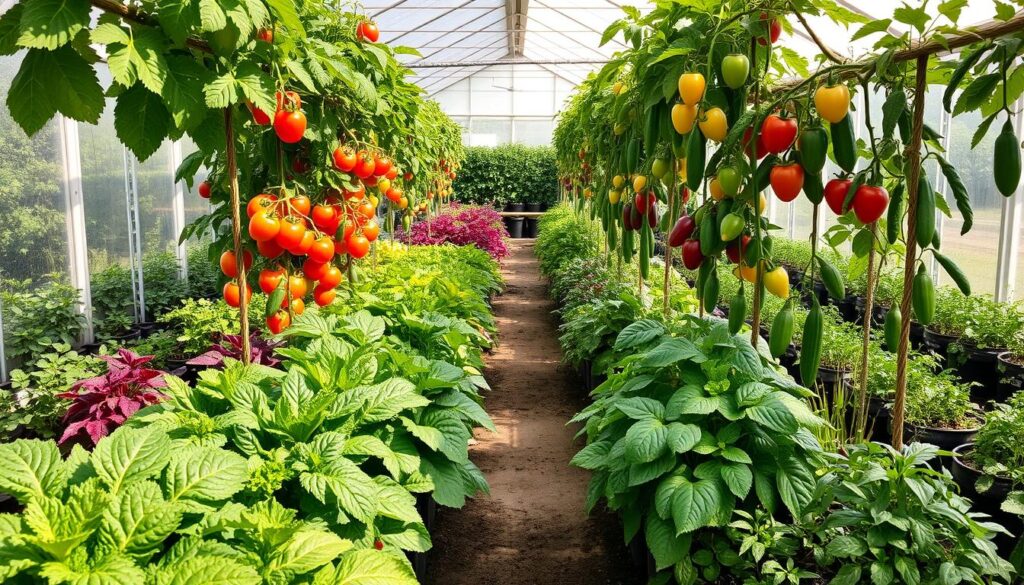
Top 10 Plants to Grow in Your Greenhouse Year-Round
Choosing the right plants is key to a successful greenhouse. You can grow cold-hardy plants, heat-loving plants, or year-round crops. There are many popular greenhouse plants and edible plants that do well in your space.
Cold-Hardy Plants
For cold days, try kale, spinach, and root vegetables like carrots and beets. These plants handle the cold well. They give you fresh greens and produce all year.
Heat-Loving Plants
Heat-tolerant plants like tomatoes, peppers, and cucumbers love the warm greenhouse. With the right temperature and humidity, you can grow lots of these sun-loving edible plants.
Versatile Year-Round Producers
For a productive greenhouse, add versatile year-round crops like herbs (such as basil, cilantro, and oregano) and strawberries, grapes, and dwarf fruit trees. These plants give you a steady harvest all seasons. They make your greenhouse diverse and rewarding.
By picking a mix of cold-hardy plants, heat-loving plants, and versatile year-round producers, you’ll have a thriving greenhouse garden. It will give you a rich harvest all year.
Greenhouse Fruit and Herb Garden
Expanding our greenhouse gardening beyond just vegetables can be rewarding. We can grow a fruit and herb oasis year-round with the right conditions. Let’s explore growing greenhouse fruits and herbs for flavor, nutrition, and beauty.
For fruit lovers, strawberries, grapes, and dwarf fruit trees like figs, peaches, and lemons do well in greenhouses. These compact, high-yield options let us enjoy homegrown fruits without needing a lot of outdoor space. We might need to manually pollinate or add pollinator-friendly plants for proper pollination.
Herbs are great for greenhouses too. Favorites like basil, cilantro, oregano, and mint love the controlled temperature and humidity. Hydroponic systems help manage water and nutrients, boosting herb growth. We can even try exotic herbs and spices like ginger and turmeric, which surprisingly grow well in greenhouses.
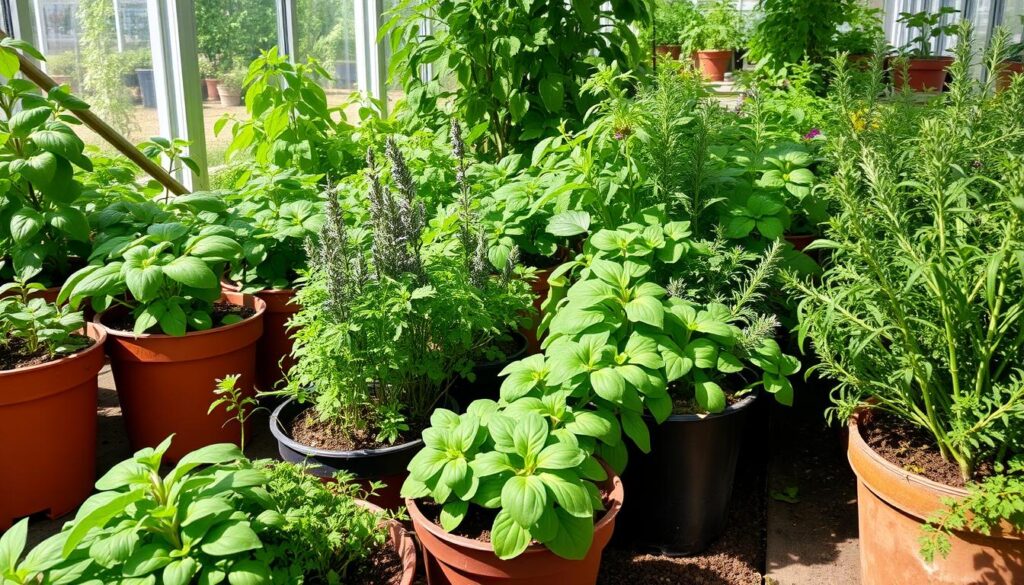
By using our greenhouse’s versatility, we can explore new flavors and enjoy fresh fruits and herbs all year. With some planning and trying new things, our greenhouse can become a haven of taste and scent.
Ornamental Plants and Flowering Species
Creating a vibrant greenhouse is all about the ornamental plants and flowering species. Tropical flowers and exotic varieties can make your greenhouse a stunning place. And don’t forget the low-maintenance options that add color and life.
Tropical Flowers
Orchids, African violets, and geraniums are perfect for greenhouses. They have lush foliage and bright blooms. These plants are easy to care for, great for both new and experienced gardeners.
Exotic Varieties
Exotic plant species like bougainvillea and caladiums add a unique touch. They are vibrant and eye-catching. With the right care, they can thrive all year.
Low-Maintenance Options
Some people prefer plants that are easy to care for. Succulents, air plants, and ferns are great choices. They require little care but add beauty to your space. Consider hanging plants to use vertical space and create a stunning display.
Your greenhouse can be a world of beauty with the right plants. Whether you love tropicals, exotics, or easy-care plants, you can create a peaceful oasis. With creativity and attention to detail, your greenhouse will be a haven of beauty.
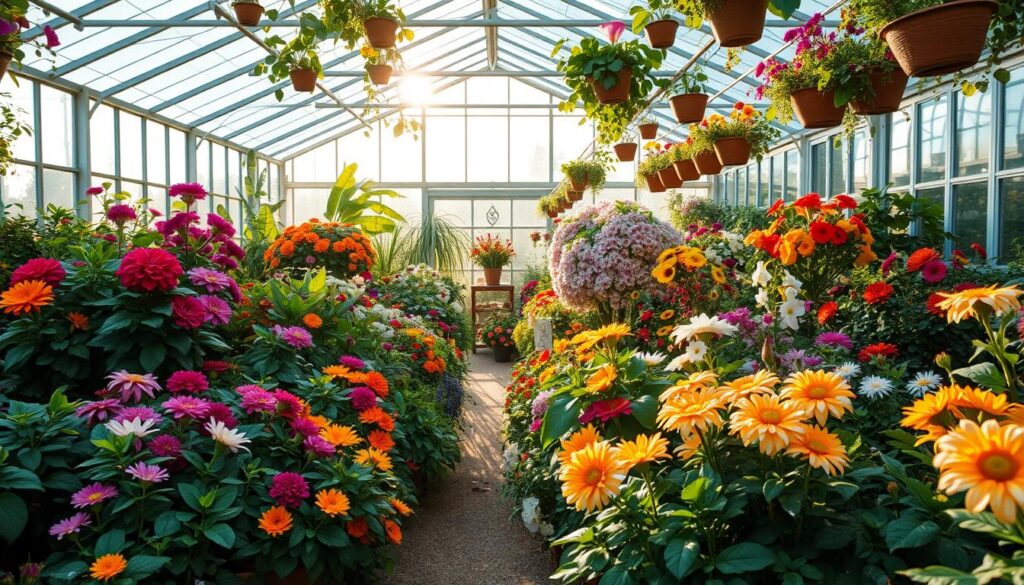
Flowers always make people better, happier, and more helpful; they are sunshine, food, and medicine for the soul.
– Luther Burbank
Conclusion
Greenhouse gardening lets us grow many plants all year. We need to control temperature, manage humidity, and plan space well. This way, we can have a garden full of veggies, fruits, herbs, and flowers.
Greenhouses are great for growing plants that like cold or heat. Mixing different plants means we get lots of food and beautiful views all year.
To keep a greenhouse healthy, we must watch for pests and meet each plant’s needs. Following these tips helps us grow food and flowers in a green way. This way, we enjoy fresh food and beautiful plants all year.
FAQ
Q: What are the key benefits of greenhouse gardening?
A: Greenhouses help us control weather and humidity. This lets us grow crops all year round. They also keep plants safe from pests and diseases, helping them grow better.
Q: How important is temperature control in a greenhouse?
A: Temperature control is key for plants. Some like it warm, others cool. Getting the temperature right helps plants grow well.
Q: How does humidity affect greenhouse gardening?
A: Humidity affects plant growth and keeps pests away. Keeping humidity right is vital for a healthy greenhouse garden.
Q: How can I maximize space utilization in my greenhouse?
A: Plan your space well to use it efficiently. Mix beds and containers for different plants. This makes the most of your greenhouse space.
Q: What types of vegetables can I grow in a greenhouse year-round?
A: You can grow many vegetables in a greenhouse. Tomatoes, peppers, and cucumbers do well. Kale, cabbage, and broccoli grow in cooler weather. Spinach and lettuce grow all year with the right temperature.
Q: What other plants can thrive in a greenhouse environment?
A: Greenhouses are great for many plants. Cold-hardy plants like kale and spinach grow well. Tomatoes, peppers, and cucumbers love the heat. Herbs like basil and cilantro grow all year. You can also grow strawberries, grapes, and dwarf fruit trees.
Q: Can I grow exotic fruits and spices in a greenhouse?
A: Yes, you can grow exotic fruits and spices like ginger and turmeric. They need the right conditions. Sometimes, you need to help with pollination.
Q: What types of ornamental plants can I grow in a greenhouse?
A: Greenhouses are perfect for tropical flowers. Orchids, African violets, and geraniums love the greenhouse. Exotic plants like bougainvillea and caladiums also thrive. Low-maintenance options include succulents, air plants, and ferns.


